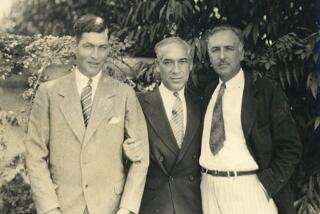For them, the goal was to make art
- Share via
They formed the most unlikely of cinematic triumvirates, but for a few years in the waning days of the 1920s and the early 1930s, Hungarian-born movie mogul William Fox and directors Frank Borzage and F.W. Murnau pushed the language of moviemaking to a high art.
This week, 20th Century Fox Studio Classics is releasing a lavish new DVD boxed set, “Murnau, Borzage and Fox,” which features 12 films made by the directors at the studio, a new feature-length documentary and two coffee-table books of photographs from the films in the collection.
As with last year’s “Ford at Fox” boxed set, “Murnau, Borzage and Fox” is a graduate course in film history and a must for any serious cineaste. Not only does it shed light on Fox’s contribution to film, it also reinvigorates the early career of Borzage and features photographic galleries and the script for Murnau’s lost American production, “4 Devils.”
Fox, said John Cork, the director of the set’s documentary, “is by far the most revolutionary of the film moguls. He was the one who was constantly fighting and changing and working to take Hollywood into the future in the fastest way possible. The way he envisioned films being made is the way we look at films now.”
Fox started out operating nickelodeons in the early 1900s in New York and went on to run a chain of successful theaters. Eventually he opened his own movie studio, Fox Film Corp., a distribution company and theater chain that he brought to Hollywood in the early 1920s. He signed Borzage, who began his career as an actor, in 1925 and brought the great German Expressionist director Murnau into the fold shortly thereafter.
Importing foreign directors was common during the silent era. Ernst Lubitsch came over from Germany and found a home at Paramount, eventually heading the studio. MGM hired Sweden’s Victor Sjostrom and Mauritz Stiller, but the directors soon discovered that studio producer Irving Thalberg wouldn’t give them the freedom they had in their homeland.
Fox was different, vowing never to interfere with a filmmaker’s artistic vision. At one point, said Cork, he told Murnau that he would “shut down every film at the studio to allow him to make his film, and they would bring other filmmakers on the set to watch how Murnau made his movies. It was a transformative moment in the history of Hollywood.”
Murnau’s influence was quickly seen in other Fox directors. John Ford’s 1928 World War I drama “Four Sons” even borrowed sets from “Sunrise,” Murnau’s haunting romantic drama about a troubled young couple that won the best picture Oscar at the inaugural Academy Awards ceremony on May 16, 1929. Fox Film received half of the 12 awards handed out that night -- including best director for Borzage for his love story “Seventh Heaven.”
When Borzage came to Fox in 1925, he excelled in eliciting strong performances from actors, but he wasn’t known for his visual style until 1929’s “Lucky Star,” also included in the set. The drama features a much more confident use of the camera and evocative sets.
“He was so deeply influenced by Murnau,” said Cork of Borzage. “He really took to the idea that you could tell the story behind the expression on the actor’s face. You would use the visual element of the film to take you inside the emotional world of the character, which is the heart of Expressionism.”
Borzage also had a deft hand with comedy, such as the 1929 farce “They Had to See Paris,” starring Will Rogers as a folksy guy from Oklahoma who strikes it rich in the oil fields and ends up living with his family in a castle in France.
Other Borzage rarities include the 1930 romantic fantasy “Liliom,” the story that became the basis of “Carousel”; the 1930 melodrama “Song O’ My Heart,” starring renowned Irish tenor John McCormack; and 1931’s “Bad Girl,” a drama about a young married couple dealing with money issues during the Depression.
Despite the stellar work the collaboration spawned, things ended tragically for Fox, Borzage and Murnau. In 1929, Fox, after nearly being killed in an auto accident, was sued by the Justice Department for violating antitrust laws after he bought out the Loew family’s holding in MGM. He subsequently lost control of his own studio in 1930 in a hostile takeover and spent six months in prison in 1936 for attempting to bribe a judge in a bankruptcy hearing.
Borzage left the studio soon after Fox lost control and headed to Paramount, eventually landing at MGM in the late 1930s. He directed several notable pictures, including 1932’s “A Farewell to Arms,” 1937’s “History Is Made at Night,” 1938’s “Three Comrades” and 1940’s “The Moral Storm,” but his output dwindled in the 1940s as he battled alcoholism in his later life.
Murnau’s follow-up to “Sunrise,” the more modestly budgeted circus tale “4 Devils,” was originally released as a silent film, but after the studio reissued the movie with talkie sequences, Murnau terminated his contract. He died in 1931 at the age of 42.
--
More to Read
Only good movies
Get the Indie Focus newsletter, Mark Olsen's weekly guide to the world of cinema.
You may occasionally receive promotional content from the Los Angeles Times.









